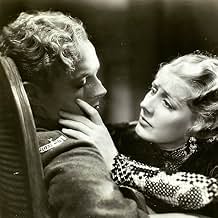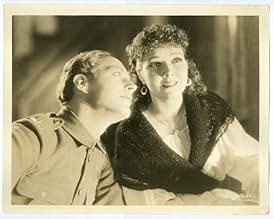Adicionar um enredo no seu idiomaShowgirl Sally meets young playboy Leonard St. John; they fall in love and are secretly married. When Leonard's father discovers this he sets out to break them apart, and following a bitter ... Ler tudoShowgirl Sally meets young playboy Leonard St. John; they fall in love and are secretly married. When Leonard's father discovers this he sets out to break them apart, and following a bitter row, Leonard kills himself, leaving Sally to pick up the pieces of her life.Showgirl Sally meets young playboy Leonard St. John; they fall in love and are secretly married. When Leonard's father discovers this he sets out to break them apart, and following a bitter row, Leonard kills himself, leaving Sally to pick up the pieces of her life.
- Direção
- Roteiristas
- Artistas
- Undetermined Secondary Role
- (cenas deletadas)
- British Soldier
- (não creditado)
- Aubrey's Butler
- (não creditado)
- Supper Club Guest
- (não creditado)
- French Hotel Desk Clerk
- (não creditado)
- Aubrey's Secretary
- (não creditado)
- Marie - the French Nurse
- (não creditado)
- Cafe Proprietress
- (não creditado)
- Commanding Officer
- (não creditado)
- Aubrey's Maid
- (não creditado)
- Direção
- Roteiristas
- Elenco e equipe completos
- Produção, bilheteria e muito mais no IMDbPro
Avaliações em destaque
An entire genre of motion pictures, which often feature Barbara Stanwyck or Lana Turner, has used this basic plot to wring tears from largely female audiences. In "The Secret of Madame Blanche," Irene Dunne takes a turn at this well-worn routine and maintains her dignity throughout, despite the script's attempts to drown her in clichés. In the role of showgirl, Sally Sanders, Dunne has a few opportunities to show off her fine voice, but the musical selections are poor. The relatively short film, which was adapted from a play, lurches forward from hackneyed scene to hackneyed scene and leaves chasms of time for the audience to fill in. Occasionally, patient viewers will be rewarded with dialog and delivery so rich in camp that they will howl helplessly with unintended laughter, although a mouth-to-mouth kiss between mother and son, perhaps common for the period, induces cringes today. While Lionel Atwill is effective as Aubrey St. John, the selfish controlling father, and Philips Holmes is appropriately weak as his son, the rich playboy, the film offers little beyond the incomparable Irene Dunne slumming in a sub-par vehicle. Coincidences abound, French accents come and go, laws benefit the rich and oppress the poor, and a mother's self-sacrificing love conquers all. What more could one ask for? Perhaps Barbara Stanwyck and "Stella Dallas?"
Now I must admit that usually a film with this many weepy scenes turns me off a bit, but the writers, directors and Irene Dunne manage to weave a tale so well that my sometime cynical nature was kept in abeyance. Plus, the amazingly awful and evil character played by Lionel Atwill was one of his best roles--one that will definitely make an impression on the viewer. Now I must admit that the impossibility of the final third of the film was at first a bit hard to take, but when the plot wrapped up like it did, I found I just didn't care--I wanted the hokey Hollywood ending and enjoyed it thoroughly. An excellent weepy film--similar to, but in many ways superior to MADAME X and SO BIG! If you liked this film, try Barbara Stanwyck's STELLA DALLAS--another great weepy melodrama.
LIONEL ATWILL is the rich father whose son (PHILLIPS HOLMES) has fallen in love with a cabaret singer and he opposes the match from the start, threatening to stop giving his son handouts to keep them solvent. The son is destitute when he learns that she's about to have a baby and finally commits suicide. The years fly by and Dunne is now a working woman in London at a not very reputable establishment populated by servicemen. It's World War I and one of the patrons is a young man who makes a fuss over not being given a room. He turns out to be her son and she is soon protecting him from a murder charge.
It's a pretty plot-heavy melodrama with enough twists and turns to keep the viewer interested, but you have to have a taste for these mother/son tear-jerkers to truly enjoy this sort of film.
The final scene with mother and son reunited at a prison after a stormy trial, is reminiscent of MADAME X--but at least here, the son learns the true identity of his mother.
Você sabia?
- CuriosidadesThe play originally opened in New York City, New York, USA on 4 December 1923 and ran for 85 performances.
- ConexõesEdited from O Grande Desfile (1925)
- Trilhas sonorasIf Love Were All
(1924) (uncredited)
Music by William Axt
Lyrics by Martha Lois Wells
Sung by Irene Dunne in a show
Principais escolhas
Detalhes
- Data de lançamento
- País de origem
- Idioma
- Também conhecido como
- The Secret of Madame Blanche
- Locações de filme
- Empresa de produção
- Consulte mais créditos da empresa na IMDbPro
- Tempo de duração
- 1 h 24 min(84 min)
- Cor
- Proporção
- 1.37 : 1





































